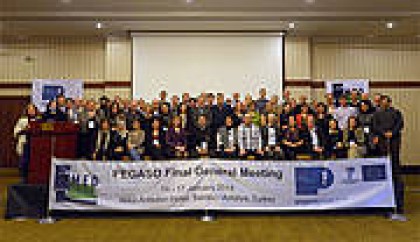
April 2014
 | April 2014 |
PEGASO’s innovative outcomes for ICZM | |
|---|---|
 The PEGASO's project final conference took place in Antalya (Turkey), from 14 to 17 January 2014, gathering a wide range of institutes and networks from the Mediterranean and the Black Sea together with representatives from Integrated Coastal Zone Management (ICZM) initiatives in other regional seas. PEGASO is a collaborative project between twenty-five partners that have co-worked over four years under the lead coordination of the Autonomous University of Barcelona to develop common, novel approaches to support integrated policies for the coastal, marine and maritime realm of the Mediterranean and Black sea basins. The ICZM Protocol to the Barcelona Convention has been the main driver of the PEGASO project. The PEGASO community - ICZM researchers, practitioners and decision-makers have worked together to achieve as main outcome a shared IZCM Governance Platform to act as a bridge between communities of scientist and End-Users, far beyond conventional linking. The Government platform has been established as a network and a forum where people with deep interest in effectively implementing ICZM have shared knowledge and experience, and tested new planning and management tools. This kind of joint effort based on the ecosystem approach and a collaborative work is called "adaptive management". According to the lead partner from the Autonomous University of Barcelona, Françoise Breton, "the PEGASO project has supported the implementation of the ICZM Protocol in the Mediterranean, and has contributed to the development of similar policies in the Black Sea, and has also bridged science and decision-making processes". PEGASO has also developed ICZM Tools to better appraise conflicting issues, responding closely to different articles from the Protocol, including climate change, risk vulnerability and adaptation (indicators, accounting methods, models and scenarios). These tools have been tested and validated in a multi‐scale approach for integrated regional assessment through a number of relevant pilot sites. All the tools are fully accessible from the PEGASO website and have served to produce some indicators' factsheets at different places, and an atlas for the Mediterranean and Black seas. To support the whole PEGASO process, a Spatial Data Infrastructure (SDI), following the INSPIRE Directive, has been implemented to organize and standardize spatial data sharing on an interactive visor, to make it available to the ICZM Platform, and to disseminate all results of the project to the End-Users and interested parties. Furthermore, PEGASO has made efforts to establish and strengthen durable mechanisms for networking and capacity development so as to promote knowledge transfer and dissemination. Over the lifespan of PEGASO, the project has mobilized successful collaborative work among some Mediterranean and Black Sea stakeholders, both at regional and at CASE or pilot site level. PEGASO ends up as an innovative and creative project which has provided exploratory ways to stakeholders to share common knowledge with scientists. This practice has given a new know-how on exchanging data and speaking together among decision makers, national and local managers, making these different professional spheres collaborating in unison. IUCN-Med and PEGASO The IUCN Centre for Mediterranean Cooperation has been a partner of the PEGASO project, contributing in the dissemination of the PEGASO activities by producing several brochures synthesizing the main PEGASO results and elaborating 6 electronic bulletins in English and French with main project news. For more information: Françoise Breton Photo: PEGASO project. Participants at the Final PEGASO conference meeting
| |